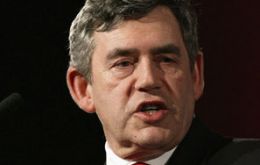MercoPress. South Atlantic News Agency
Stories for 2008
-
Thursday, October 16th 2008 - 20:00 UTC
PM Brown's blueprint to reshape financial world order

British Prime Minister Gordon Brown called on Wednesday for an international conference before the end of the year to reshape the financial world order.
-
Thursday, October 16th 2008 - 20:00 UTC
Mexico lost 10% of international reserves to prop the Peso

The Mexican peso closed trading Wednesday at 12.74 to the US dollar, compared to 12.50 on Tuesday, with a depreciation of 1.8% having oscillated up to 12.82. The central bank on Wednesday morning auctioned 400 million US dollars as had been anticipated by government officials.
-
Thursday, October 16th 2008 - 20:00 UTC
Brazil Bovespa looses 11.04% and is again below 40.000 points

Brazilian shares plummeted more than 10% on Wednesday, triggering a trading halt, as mounting fears of global recession battered markets worldwide.
-
Thursday, October 16th 2008 - 20:00 UTC
UK petrol below £1 per litre for the first time in 2008

British consumers hit by the credit crunch had something to smile about at last when petrol dipped below the £1 a litre mark for the first time this year. There was more cheer for travellers when two major UK airlines - British Airways and Virgin Atlantic - announced a reduction in fuel surcharges.
-
Thursday, October 16th 2008 - 20:00 UTC
Drug related crime, biggest threat in the Americas says UN

Drug trafficking and the violence committed by its associated organized crime is the biggest threat to public safety in the Americas, according to the Executive Director of the United Nations Office on Drugs and Crime (UNODC).
-
Thursday, October 16th 2008 - 20:00 UTC
Obama or McCain, Latam policy “more or less the same”

United States policy towards Latinamerica will remain “more or less” on the same terms whether John McCain or Democrat Barak Obama wins the coming November presidential election, said US ambassador in Nicaragua Robert Callahan.
-
Thursday, October 16th 2008 - 20:00 UTC
Chilean Navy confirms killing of British priest in 1973

Despite decades of denial surrounding the kidnapping, torture and death of British-Chilean priest Michael Woodward, a retired Chilean Navy official has admitted that the priest died aboard the school ship “Esmeralda”.
-
Thursday, October 16th 2008 - 20:00 UTC
Uruguay has a “financial shield” of 2 billion USD

Uruguay has a financial protection in the range of two billion US dollars if for some reason the current situation in global markets in the next two years makes it highly difficult to issue sovereign bonds, according to Central Bank sources in Montevideo.
-
Thursday, October 16th 2008 - 20:00 UTC
OPEC emergency meeting moved forward to October 24

The Organisation of Petroleum Exporting Countries, OPEC, has brought forward an emergency meeting to discuss the effect of the global financial crisis on oil markets. The announcement was made public when oil prices plunged below 67 USD the barrel.
-
Thursday, October 16th 2008 - 20:00 UTC
Latam: 15 million risk falling back into poverty says Cepal

Almost fifteen million people from Latinamerica and the Caribbean will fall back into poverty in the coming years because of the increase in food prices and a slower economic growth in the region, forecasted the United Nations Latinamerica and Caribbean Economic Commission, Cepal.
